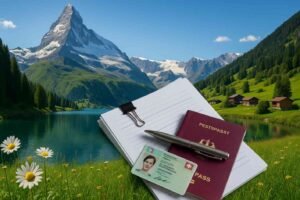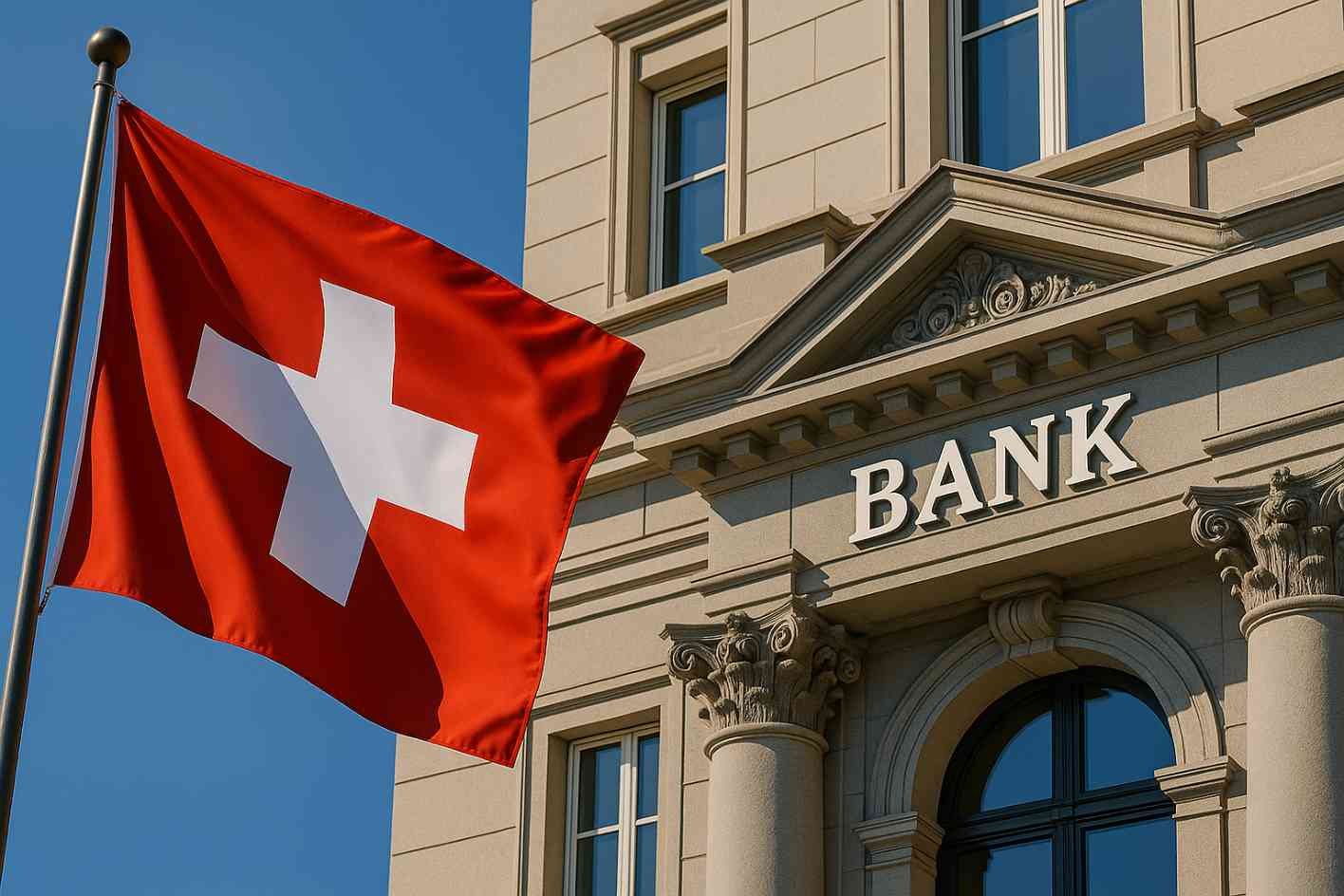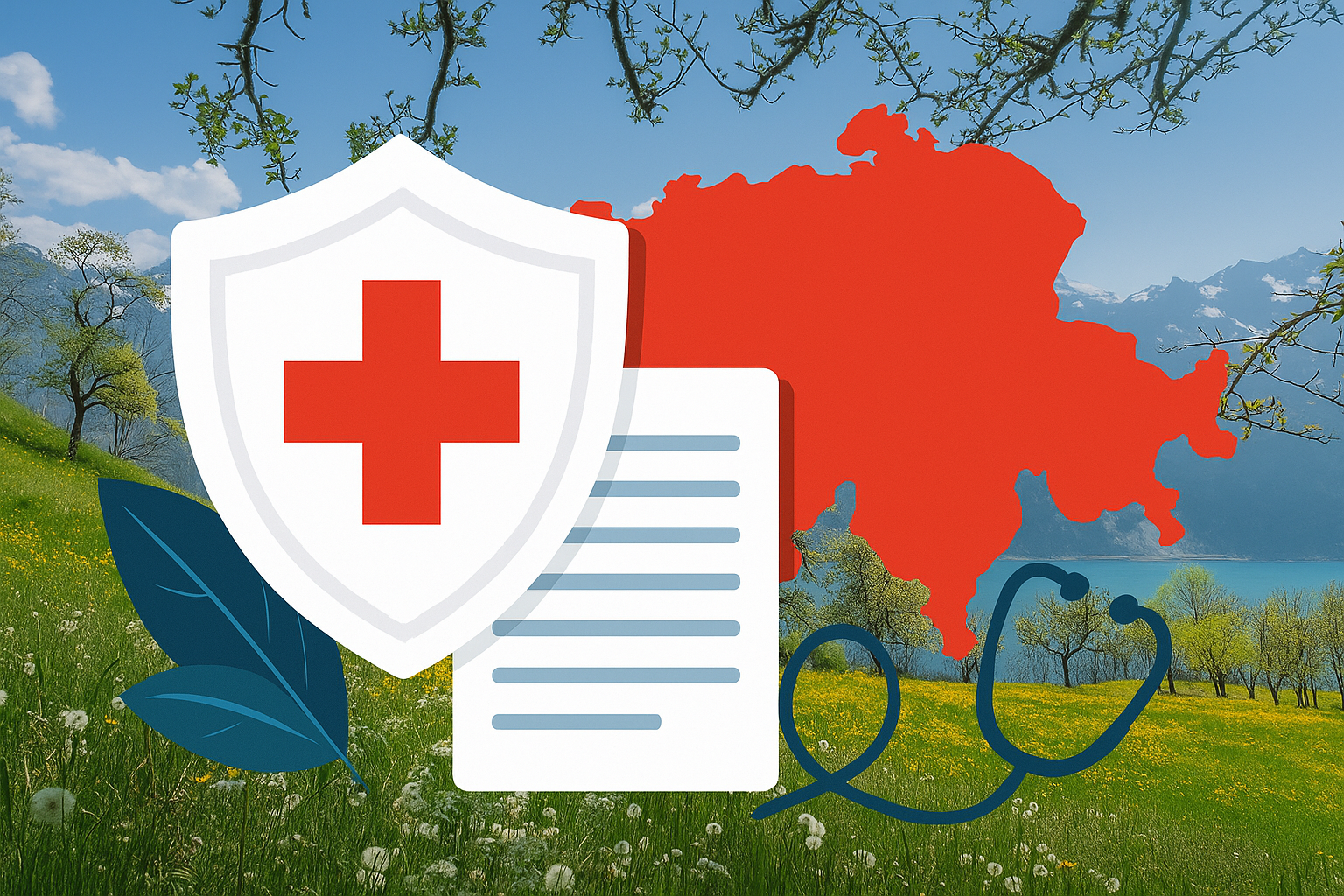How to Open a Bank Account in Switzerland
When I first moved to Switzerland, one of the things that stressed me out more than I expected was opening a bank account. You’d think it would be as simple as walking into a bank and signing a few papers but in reality, I found myself bouncing between confusing websites, bank branches that closed earlier than expected, and lists of required documents I didn’t fully understand.
I still remember sitting in a tiny apartment in Lausanne, holding my residence permit in one hand and Googling “how to open a bank account in Switzerland” on my phone with the other feeling a little overwhelmed, a little lost, and honestly, just hoping not to make a costly mistake.
And that’s exactly why I’ve written this guide.
I’ve created Swiss Sustain with one goal in mind: to give people real, honest, and clear guidance based on what I’ve experienced firsthand here in Switzerland. Whether you’re planning your move, already living here, or just curious about how Swiss banking works, this guide is for you.
Why this article matters (and why it’s different)
Opening a bank account in Switzerland isn’t overly difficult, but it’s easy to get stuck if you don’t know what you’re doing. There are rules that depend on your residency status, banks that seem friendly but charge hidden fees, and online-only options that are convenient but maybe not ideal for everyone.
So, instead of giving you generic info, I’ll share:
- The exact documents you need, and what to do if you’re missing one
- The best banks to choose in 2025 (based on who you are and what you need)
- Step-by-step guidance, whether you’re applying in person or online
- Personal advice from someone who has actually opened multiple accounts here
- Pros and cons of each option so you don’t waste time or money
Who is this for
- If you’re an expat, student, or worker moving to Switzerland
- If you’re a digital nomad or freelancer needing a Swiss account for stability
- If you’re just tired of all the conflicting advice and want the real truth
You’re in the right place.
Because this isn’t just an article, it’s the guide I wish I had when I first arrived here. I want to make your life easier by sharing what I’ve learned (sometimes the hard way). You won’t just find the what here, you’ll find the why, how, and what to avoid.
So let’s start from the beginning and get you set up the right way with confidence and clarity.
 Why Open a Bank Account in Switzerland?
Why Open a Bank Account in Switzerland?
If you’re planning to stay in Switzerland for more than a few weeks, opening a local bank account isn’t just a convenience, it’s a necessity.
When I first arrived here, I tried using my international bank card for everything. It worked for a while. But soon, I ran into real problems:
- My landlord wouldn’t accept rent payments from a foreign bank
- Some utility providers only accepted local IBANs
- I kept getting hit with foreign transaction fees every time I made a payment
- And don’t even get me started on the painfully slow refunds from local businesses
Eventually, I realized: not having a Swiss bank account was making life here harder than it needed to be.
Everyday Life Runs Through a Swiss Account
From public transport subscriptions to health insurance premiums, almost every part of Swiss life assumes that you have a local account. In fact, some employers won’t pay you without one.
Here are just a few real-life examples of what I use my Swiss bank account for:
- Paying rent with a standing order (very common here)
- Paying bills via QR codes, which are standard now
- Getting reimbursed for health insurance claims
- Transferring money to friends using Twint (Switzerland’s go-to peer payment app)
- Receiving my monthly salary without international fees or delays
Pros and Cons of Having a Swiss Bank Account
Let’s keep it honest, here’s the real deal based on experience:
Advantages:
- Avoid hidden foreign fees when paying bills or shopping
- Faster salary payments and refunds from Swiss companies
- Access to local apps like Twint, SBB Mobile, and bill scanners
- Better trust and recognition when dealing with landlords or services
- Necessary for legal/financial compliance if you’re a resident
Disadvantages (and how to manage them):
- Some banks charge monthly fees, but this is avoidable with student/digital accounts
- Too many options can be overwhelming – that’s why this guide exists
- Banks can be strict about documentation, especially if you’re a non-resident, which we’ll cover later
Opening a Swiss bank account isn’t just about banking! It’s about integrating into life here smoothly. Once I made the switch, everything from my rent payments to my shopping became easier, and I stopped worrying about every transaction triggering a foreign charge.
That peace of mind? Honestly, it’s worth it.
 Documents & Requirements to Open a Swiss Bank Account (2025 Updated)
Documents & Requirements to Open a Swiss Bank Account (2025 Updated)
Let’s talk logistics. One of the first things I struggled with when opening my account in Switzerland was figuring out the paperwork. It wasn’t always clear which documents were essential, which ones were optional, and how strict each bank would be.
Now that I’ve opened multiple accounts (first with PostFinance, later with Neon), I’ve seen how different banks approach it. Let me break it down for you, based on 2025 standards and real-life experience.
Basic Documents You’ll Need (Regardless of Bank)
Whether you’re applying online or in person, these are the must-have documents almost every bank in Switzerland asks for:
- Valid Passport or National ID
- Has to be current and in good condition
- Some banks may also accept a Swiss driving license, but your passport is the safest bet
- Swiss Residence Permit (L, B, C, G, etc.)
- This is non-negotiable if you’re a resident
- If you’re still waiting for your permit, ask for a temporary letter from the migration office. PostFinance accepted mine when my permit card was delayed
- Proof of Swiss Address
- This one confused me at first. Your address must be current and local.
- I used my rental contract, but other options include:
→Utility bills (within the last 3 months)
→A certificate of residence from your Gemeinde (local commune office)
→A registration confirmation from your city hall
- Proof of Income or Employment (Optional, but often helpful)
- Some banks ask for this upfront, especially UBS or Credit Suisse
- I gave them my employment contract, but freelancers or students can often get by with a university letter or business registration
What If You’re a Foreigner or New Arrival?
When I first arrived in Switzerland, I didn’t yet have my residence permit or a utility bill. Here’s what I did:
- Step 1: I asked my landlord for a written confirmation of my move-in date
- Step 2: I took that and my rental agreement to the local city hall to get a temporary Wohnsitzbestätigung (residency confirmation)
- Step 3: That paper, along with my passport, was accepted by PostFinance for the initial account setup
Pro tip: Smaller or digital banks (like Neon or Zak) tend to be more flexible with new arrivals! They often don’t require proof of income, just a valid ID and address.
What If You’re a Non-Resident?
If you’re not living in Switzerland but still want to open an account here, for example, to hold Swiss francs or manage property, you’ll need:
- A strong justification (e.g., Swiss business ties, property ownership)
- Proof of foreign address and identity
- Additional compliance checks (anti-money laundering, tax compliance, etc.)
Keep in mind:
- Some banks don’t accept non-resident clients anymore in 2025, or require CHF 100,000+ deposits
- Your best option may be a private bank or an international banking specialist
- Expect higher maintenance fees and more documentation
Quick Checklist: What You Should Prepare
| Document | Required? | Notes |
| Passport or national ID | Yes | Must be valid |
| Swiss residence permit | Yes (if resident) | L, B, C, G accepted |
| Proof of address | Yes | Rental contract, utility bill, or city hall document |
| Proof of income | Sometimes | Especially for traditional banks |
| Reason for account (non-residents) | Yes | May be requested during a compliance check |
Having all your documents ready saves time and stress. I remember going back and forth to my local branch three times because I missed a small but important paper. Don’t be like me, check twice, go once.
 Best Banks in Switzerland (Compared)
Best Banks in Switzerland (Compared)
Switzerland has a reputation for world-class banking, aaaaabut when you’re living here day to day, what really matters is:
Which bank is actually the best for you?
Having personally opened accounts at both traditional banks (like PostFinance) and newer digital ones (like Neon), I can tell you there’s no “one-size-fits-all” answer. It depends on your lifestyle, needs, and even how comfortable you are with technology.
Let me break down the most popular options in 2025, the banks real people like us actually use, and help you figure out which one suits you best.
Quick Comparison Table: Swiss Bank Accounts in 2025
| Bank | Type | Monthly Fee | Best For | My Personal Verdict |
| PostFinance | Traditional | CHF 5 (free for young adults/students) | New arrivals, stability | Most foreigner-friendly, easy to start with |
| UBS | Traditional | CHF 10+ | Professionals, long-term expats | Solid but pricey, great customer service |
| Credit Suisse (Now CS by UBS) | Traditional | CHF 12+ | High-income, wealth clients | Strong legacy, but not expat-focused |
| Raiffeisen | Cooperative | CHF 3–10 | Families, rural residents | Community-focused, but less digital |
| Neon | Digital | Free | Students, freelancers, tech-savvy | My favorite for simplicity and cost-saving |
| Zak (by Bank Cler) | Digital | Free | Mobile users, minimalists | Good features, less flexible than Neon |
| Yuh (by PostFinance & Swissquote) | Digital | Free | Investors, savers | Hybrid app with solid investment tools |
My Real-Life Experience with Swiss Banks
Let me give you some personal insight:
PostFinance
My first bank in Switzerland – and honestly, it made settling in a lot easier.
Why I chose it: They accepted me with just my passport, rental agreement, and residence permit—even before I had a job.
Great for: Expats, students, or anyone new to the country
Watch out: Basic account has a small fee (CHF 5/month), but it’s waived if you’re under 26 or a student
Personal Tip: Their mobile app isn’t fancy, but it gets the job done. I loved the free debit card and reliable bill payments.
Neon
After a year, I opened a Neon account, and it completely changed how I bank.
Why I switched: It’s 100% free, fast, and runs entirely on your phone
Great for: Tech-savvy users, freelancers, people who travel
Watch out: No physical branches, and cash deposits are limited
Personal Tip: I use Neon for everyday spending, and PostFinance for bigger payments like rent. That combo has worked perfectly for me.
UBS
- I briefly tested UBS when I was considering a mortgage.
- Top-notch customer service, physical branches everywhere
- High fees unless you meet certain criteria or have investments with them
My take: If you’re earning well and want a premium experience, go for it, but it’s not ideal if you’re watching your budget
Zak & Yuh
I tried both briefly.
- Zak: Simple UI, built by a real bank (Cler), and good for those who want to stick with Swiss-only solutions
- Yuh: A fun hybrid, it’s a spending + saving + investing app in one, great if you’re interested in digital wealth building
My advice: Try them if you’re curious, but Neon still beats them on day-to-day practicality
Which Bank Is Right for You?
Here’s a quick cheat sheet based on your situation:
- Student or under 25? → PostFinance or Neon (free accounts, easy setup)
- Freelancer or digital nomad? → Neon (low fees, flexibility)
- Family or long-term resident? → UBS or Raiffeisen (support, branches, loans)
- Non-resident or high net worth? → UBS / CS (if they accept you, prepare for extra checks)
- Want a bank on your phone? → Neon, Zak, or Yuh
My Personal Recommendation (Quick Verdict)
If I had to choose just one account to start with in Switzerland today, I’d go with:
PostFinance for stability and ease as a new arrival
Neon for day-to-day use, freedom from fees, and full mobile control
Combo strategy? That’s what I use and it’s worked brilliantly.
Can Non-Residents Open a Bank Account in Switzerland?
This is one of the most asked and misunderstood questions I get: Can I open a Swiss bank account if I don’t live in Switzerland?
The short answer?
Yes, it’s still possible in 2025, but it’s not easy and definitely not for everyone.
Let me walk you through what I’ve learned from personal research, helping friends, and a few real-life cases.
Meet Alex: A Freelancer from Spain
A friend of mine, Alex, is a remote worker based in Barcelona. He wanted a Swiss account to hold CHF, reduce currency risk, and eventually move to Switzerland part-time.
He thought opening an account would be simple, after all, it’s just a bank account, right?
Wrong.
Three banks rejected his application right away. Others required:
- Proof of strong ties to Switzerland (like property, job contracts, or family)
- A minimum deposit of CHF 100,000+ (yes, really)
- In-person visits and enhanced identity checks are required due to Swiss anti-money laundering laws
Eventually, he succeeded but only after working with a private wealth manager who helped open an account with a boutique private bank in Zurich. But the setup fee alone was CHF 500, with annual maintenance fees on top.
That experience taught me a lot about the current system. Here’s what you need to know.
Rules for Non-Residents (2025 Update)
Switzerland has tightened rules in recent years due to global transparency laws and pressure to combat tax evasion. Today, non-residents must meet stricter standards.
What most banks require:
- Valid passport
- Verified foreign address
- Clear explanation of why you need a Swiss account (e.g., investment, real estate, Swiss employer)
- In some cases, proof of wealth or income sources
- Willingness to physically visit a branch (most do not allow remote setup)
Which Banks Might Accept Non-Residents?
| Bank | Accepts Non-Residents? | Notes |
| UBS | With a high minimum balance (CHF 100k+) | Best for wealth clients |
| Credit Suisse (CS) | Similar to UBS, stricter screening | For high-net-worth only |
| PostFinance | No longer accepts non-residents | It was once an option |
| Neon / Zak / Yuh | Only available to Swiss residents | Digital-only, no non-resident pathway |
| Private Banks | Yes, case-by-case | Requires financial justification and higher costs |
Common Mistakes to Avoid
- Thinking digital banks will work for you: Most are geo-restricted. Neon, for example, requires a Swiss mobile number and address.
- Skipping compliance checks: Swiss banks will report to foreign tax authorities if needed.
- Assuming all Swiss banks are like offshore tax havens: Those days are long gone. Expect transparency and regulation.
My Honest Advice
If you’re a non-resident and you:
- Have legitimate financial ties to Switzerland (work, property, legal presence)
- Are you prepared for extra paperwork and costs?
- Can travel to Switzerland in person if required
… then yes, it’s possible. But if you’re just looking for a “safe place to park money” anonymously, you’ll hit a wall.
If you’re serious about opening an account, your best bet is to contact a private bank directly or go through a licensed financial advisor in Switzerland.
How to Open a Swiss Bank Account Online (Step-by-Step)
Let’s make this super clear:
Yes, in 2025, you can absolutely open a Swiss bank account online – easily, securely, and without stepping into a bank.
I’ve done it twice — once with Neon and once with Zak. Both took less than 30 minutes, but only after I had all my documents ready (learned that the hard way the first time).
Let’s walk through the full process, step by step – with personal notes to guide you.
Step-by-Step: Open a Swiss Bank Account Online in 2025
Step 1: Choose the Right Bank
Pick a bank that suits your needs (see Section 4!). For online opening, I recommend:
- Neon (100% mobile and free)
- Zak (also mobile-based, with saving features)
- Yuh (great for investing & saving in multiple currencies)
I personally love Neon for its clean app and no fees – more on that below.
Step 2: Download the App
Go to the App Store or Google Play, search for the bank (e.g., “Neon Switzerland”), and download the official app.
Tip: Make sure your phone region is set to Switzerland and you have a Swiss SIM card, especially for SMS verification.
Step 3: Create Your Account
Open the app and hit “Open Account”. You’ll be asked to:
- Enter your full name, date of birth, and email
- Create a secure password
- Verify your phone number (SMS code)
When I did this with Neon, the onboarding flow was very smooth – I didn’t even need a computer.
Step 4: Upload Your Documents
Be ready to upload (or take pictures of):
- Passport or ID
- Swiss address proof (rental contract, utility bill, etc.)
- Residence permit (L, B, C) – a scanned copy is enough
I used my B-permit and a PDF of my rental contract – both were accepted in minutes.
Step 5: Video Identification (Quick but Important)
This is the most crucial part and where I got stuck the first time.
A staff member (or automated system) will start a quick video call:
- Show your face clearly
- Hold up your ID next to your face
- Follow prompts (e.g., move your head, say your name, etc.)
Tip: Do this in a quiet, well-lit room with a strong Wi-Fi connection.
I had to redo mine because my lighting was bad, and the camera couldn’t scan my passport clearly.
Step 6: Wait for Confirmation
After ID verification, the app will confirm everything’s been submitted.
Approval usually takes:
- 24-48 hours for Neon/Zak
- A few hours for some (mine was approved the next morning!)
You’ll then receive:
- Your IBAN/account number
- A physical debit card by mail (usually within 5–7 business days)
My Experience (The Good and The Learning Curve)
When I first opened my Neon account, I assumed I could just upload my passport and be done.
I wasn’t prepared for the video ID call, and the low camera quality on my old phone caused a delay.
After switching to better lighting and restarting the ID process, it went through smoothly.
Now? I use that account for everything: rent payments, shopping, even international transfers.
Summary: Opening a Swiss Account Online
| Step | Action |
| 1 | Pick a bank (Neon, Zak, Yuh) |
| 2 | Download app |
| 3 | Enter personal details |
| 4 | Upload ID + address documents |
| 5 | Complete video ID check |
| 6 | Wait for account approval |
That’s it! It’s safe, legal, and becoming the new normal in Switzerland, especially among younger residents, expats, and freelancers.
Fees, Costs & Money-Saving Tips
Let me tell you the truth:
Banking in Switzerland isn’t free – even if it feels like it should be.
Whether you’re new here or have lived in Switzerland for years, hidden fees can quietly drain your money. I’ve been caught off-guard a few times, and I want to make sure you don’t have to learn the hard way.
Common Hidden Fees in Swiss Bank Accounts
Here’s what you’ll want to watch for even at so-called “free” banks:
| Fee Type | What It Means | Watch Out For |
| Monthly Account Fees | Charged just for having an account | Some charge CHF 5–12/month unless you meet conditions |
| Foreign Currency Transactions | Every time you spend abroad or in a non-CHF currency | Can add 1.5–2.5% to your costs silently |
| ATM Withdrawal Fees | Especially from other bank ATMs | Up to CHF 2–5 per withdrawal |
| Card Replacement Fees | Lost card? Replacement can cost CHF 20+ | |
| Inactivity Fees | Some banks charge if your account is dormant | |
| SEPA or International Transfers | Fees vary widely by bank and destination |
I once paid over CHF 60 in hidden currency fees after a short trip to France — I didn’t realize my debit card was converting at a horrible exchange rate. I now use Neon for travel, which has no FX markup!
How to Avoid or Reduce Banking Fees
Here’s what I personally do now to keep my banking nearly free:
1. Use Neon for Everyday Spending
- No monthly fee, no FX markup on foreign payments
- Perfect if you shop online or travel outside Switzerland:
Neon Fee Overview Tool (Official)
2. Keep a Minimal Balance in Traditional Banks
- PostFinance or UBS may waive fees if you maintain a certain balance or receive regular income
I keep just enough in my PostFinance account to pay rent and health insurance — everything else runs through Neon.
3. Avoid ATM Fees
- Use your own bank’s ATMs when possible
- Withdraw once a month in a larger amount instead of frequent small amounts
4. Watch Out for Foreign Currency Traps
- Always choose to be charged in local currency when abroad – never in CHF
The dynamic currency conversion option (CHF instead of local currency) is a total rip-off.
Tools to Help You Compare Fees
Final Word from Me
It’s incredibly easy to let CHF 5 here, CHF 2 there quietly disappear from your account.
But over a year? That could be CHF 150–300 gone.
By being intentional and switching to smarter tools, I’ve saved over CHF 400 in a year.
And I promise once you set it up right, you’ll feel more in control of your money here.
Is Swiss Banking Safe? (Trust & Security)
When I first moved to Switzerland, one of my top concerns was:
Can I really trust Swiss banks with my money and data?
Now that I’ve been banking here for years, my answer is a solid yes – and here’s why.
Switzerland = Global Gold Standard for Banking Safety
Switzerland has long been seen as one of the safest and most stable financial systems in the world, and that’s not just a myth. Here’s what makes it so secure:
Strong Banking Secrecy & Data Protection
- Swiss law protects customer privacy under Banking Law Article 47, which makes it illegal for banks to disclose personal financial info without consent or a legal order.
- Data is encrypted and stored under strict security protocols. Most servers are located within Switzerland itself.
Personally, I sleep well at night knowing my information isn’t being sold or shared with random third parties, like I’ve experienced with some banks abroad.
Government Deposit Protection
- If a Swiss bank were to collapse (rare, but possible), the government guarantees up to CHF 100,000 per person per bank.
- This guarantee is backed by Esisuisse, Switzerland’s official deposit insurance scheme.
Learn more about Esisuisse
This was the final factor that convinced me to move most of my savings into a Swiss account I knew my money had a safety net.
Mobile Banking = Just as Safe (If Not Safer)
I use mobile banking apps like Neon and Zak, and they come with:
- Two-factor authentication (2FA)
- Biometric login (Face ID or fingerprint)
- Instant alerts for every transaction
- Advanced fraud detection systems
I’ve never had a single case of unauthorized access or weird charges. But I do regularly update passwords and check transactions, basic online hygiene!
My Honest Comfort Level
From using big banks like PostFinance to modern mobile ones like Yuh, I’ve always felt that Swiss banks take safety seriously.
And here’s the big difference I’ve noticed:
In Switzerland, security is not just a feature! It’s a culture. You’ll see it in how banks interact with customers, how strict they are with ID checks, and even how seriously they take small fraud flags.
If you’re considering banking in Switzerland and wondering about safety, you’re in good hands.
Your data is protected. Your money is insured. And the entire system is built on stability, privacy, and trust.
My Personal Recommendations & Tips
If you’re feeling overwhelmed by all the banks, fees, apps, and paperwork, believe me, you’re not alone.
When I first tried to open a bank account in Switzerland, I thought, “I’ll just walk into a bank, show my passport, and be done in an hour. Wrong!
The reality was slower, more expensive, and filled with tiny details no one tells you until you live through it.
That’s why I want to share what I’ve learned, what I’d do differently, and how you can avoid the same headaches.
What Worked Best for Me
After trying three different banks (PostFinance, Neon, and Yuh), here’s what I personally recommend:
Everyday Banking: Neon
- No monthly fees
- Free card + free SEPA transfers
- Easy mobile app and no-nonsense
I use Neon for all my daily spending, grocery shopping, online orders, and subscriptions. The app gives instant notifications, and I love that I don’t need to worry about surprise fees.
Big Bill Payments & Rent: PostFinance
- Good for structured Swiss bills (like QR invoices)
- More accepted by landlords, health insurers, etc.
I don’t love the CHF 5/month fee, but I’ve kept it because it’s still widely accepted by government services and housing companies.
International Use / Currency Savings: Yuh
- Let’s you hold multiple currencies
- Easy to invest and save money long-term
- Great if you travel often or send money abroad
My Mistake: Chasing Perks Without Reading the Fine Print
Early on, I picked a fancy account with a bonus but I didn’t realize:
- It had a CHF 12 monthly fee
- The bonus expired after 3 months
- I was locked into a package I didn’t actually need
Lesson learned: If it looks too good to be true, it probably is. Always ask for a detailed fee breakdown, and compare it to your actual usage habits.
If I Were Starting Over in 2025…
Here’s exactly what I’d do:
- Download Neon first get your free account rolling in 15 minutes
- Open a second account with PostFinance only if you need to pay rent or get paid by a Swiss employer
- Use Wise or Revolut alongside your Swiss account for low-fee international transfers
- Track your banking costs for 3 months to see where you’re losing money
- Don’t sign up for packages you don’t need Simplicity wins in Switzerland
Final Thought
Swiss banking can feel complex, but once you find the right fit, life becomes much easier.
Having the right account saved me hundreds of francs in fees, countless hours of frustration, and honestly… it gave me peace of mind knowing my money was safe, accessible, and under control.
So if you’re standing at the beginning of your Swiss journey, whether you’re moving, visiting, or simply curious, my advice is simple:
Start smart. Stay curious. Keep it simple.
Final Thoughts + What to Do Next
If you’ve made it this far, first of all, thank you.
I truly hope this guide has made you feel more informed, more confident, and more prepared to open your bank account in Switzerland.
I know how overwhelming it can feel at first. New country, new rules, and so many banks promising “the best offer.” But with the right information (and a little patience), it doesn’t have to be hard.
Whether you’re a new resident, a student, a digital nomad, or just planning ahead, the goal of Swiss Sustain is to help you live smarter and smoother in Switzerland.
What’s Next?
Pick the bank that fits your life.
Use the step-by-step guide above to open your account online.
Bookmark this article, you’ll probably need it again.
Need help or have a question?
I’d love to hear from you!
Whether you’re stuck on paperwork, unsure which bank is right for you, or just want a second opinion, feel free to contact me here. I reply personally.
Also, check out my other guides:
Cost of Living in Switzerland (2025 Guide)
What is the Fastest Way to Become a Swiss Citizen – Step-by-Step
You’ve got this.
And if you ever feel stuck, remember I’ve been there too.
You’re not alone on this journey.
Until next time,
Swiss Sustain















[…] Linked to your Swiss bank account […]
[…] your hard-earned cash for, and how to go about crafting a honeymoon that suits both your heart and your bank […]
[…] first, this felt stressful. I had only just arrived, I was still trying to figure out housing and bank accounts, and suddenly there was this urgent three-month deadline hanging over my head. I remember feeling […]
[…] But remember to value money. Geneva is an expensive city, but I have my share of places offering large portions, warm service, and an authentic local touch without breaking the bank. […]
[…] with excitement in my heart, but also a lot of unanswered questions. Where would I live? How do I open a bank account? What should health insurance look like? Even the banal stuff, like taking the train or grocery […]
[…] Step-by-Step Complete Opening Process: You should know everything. […]